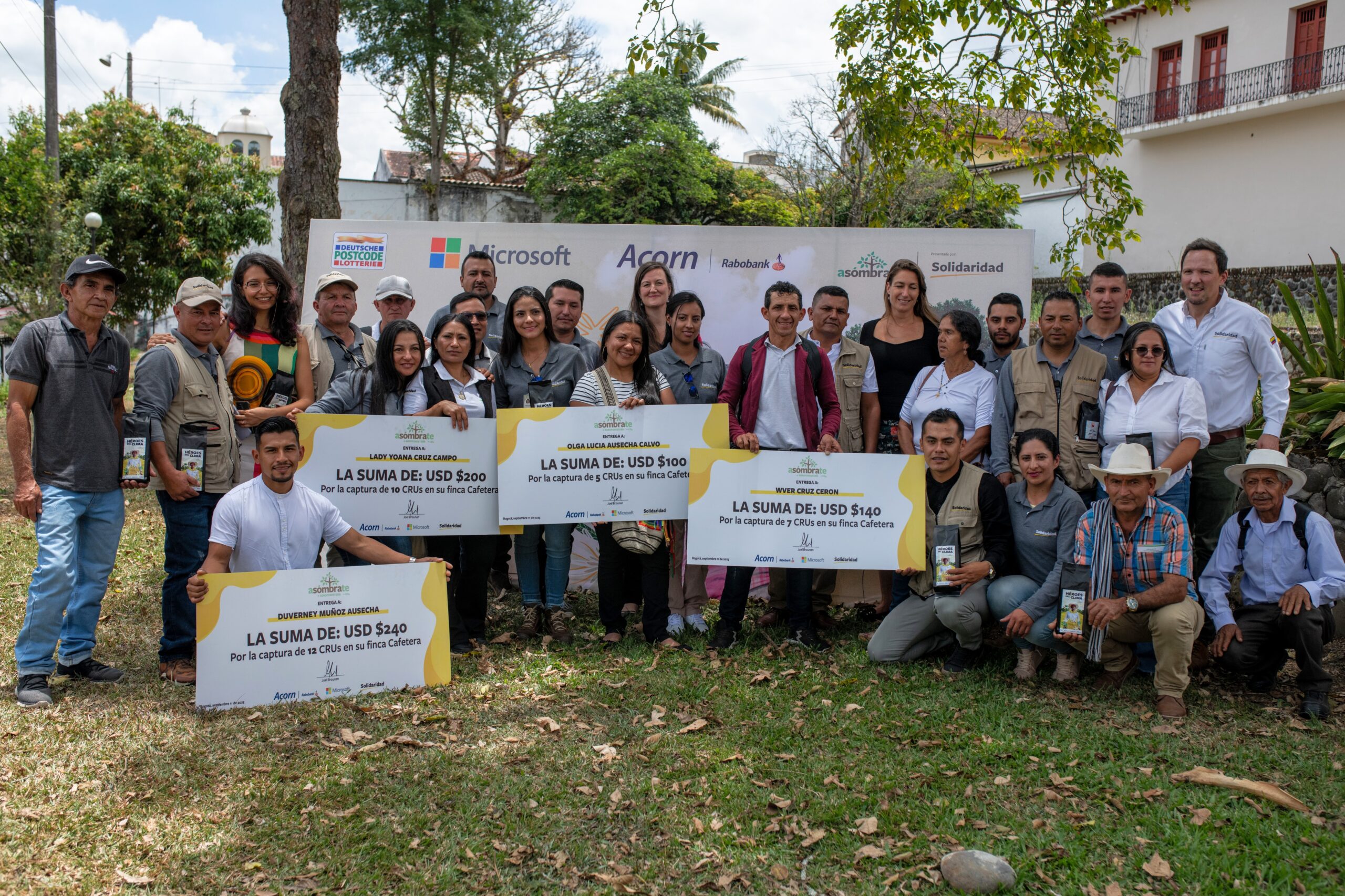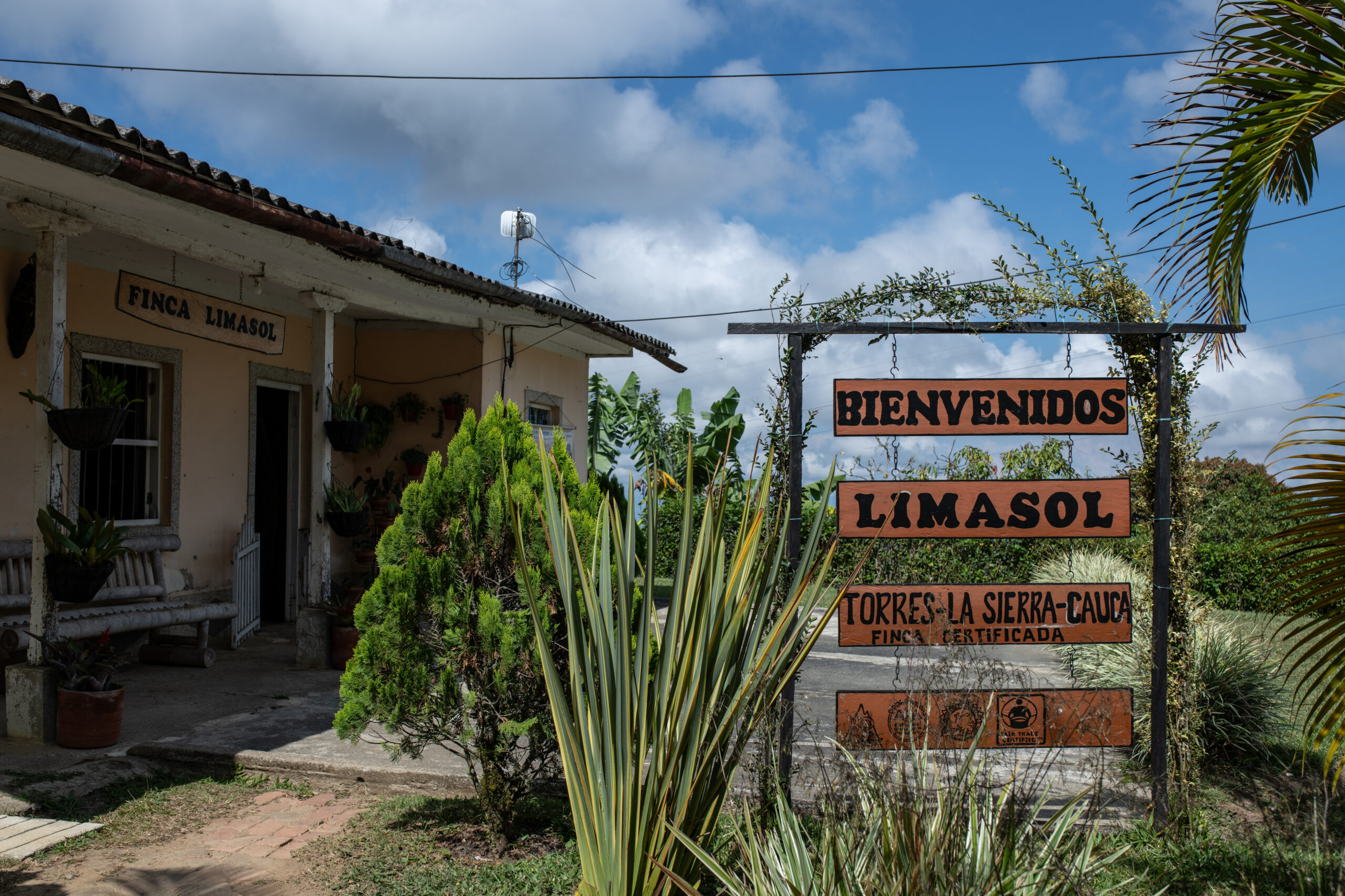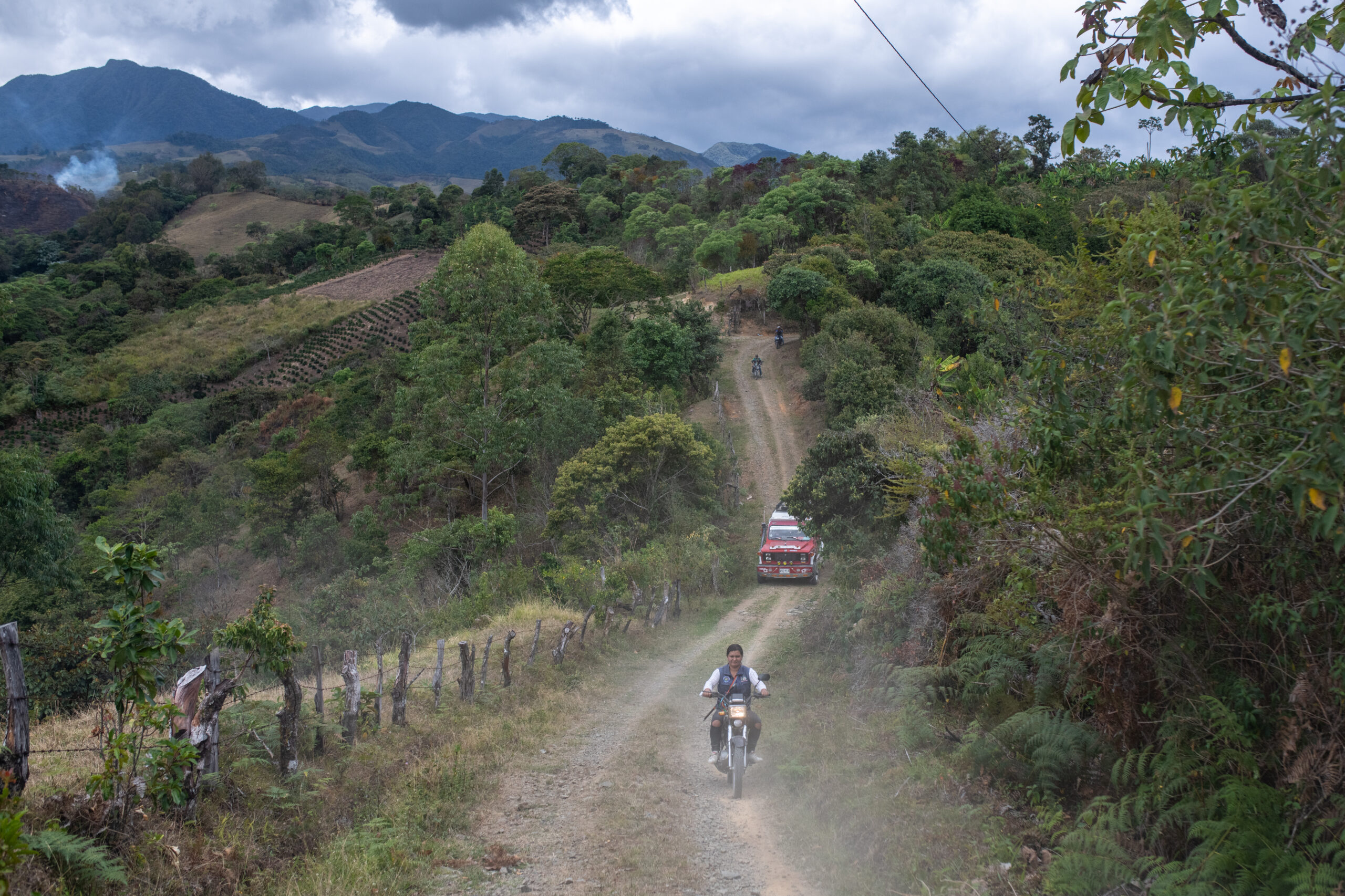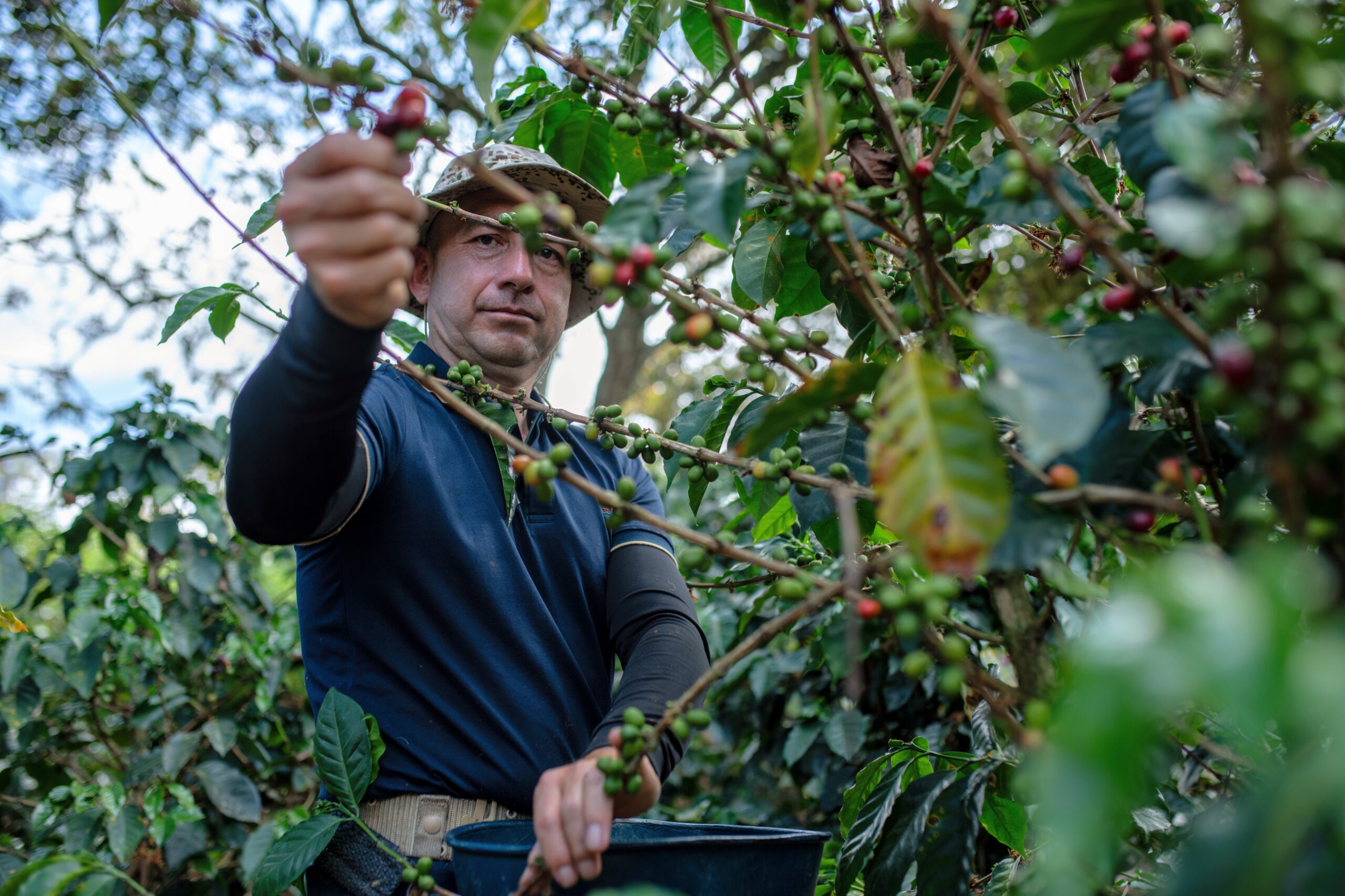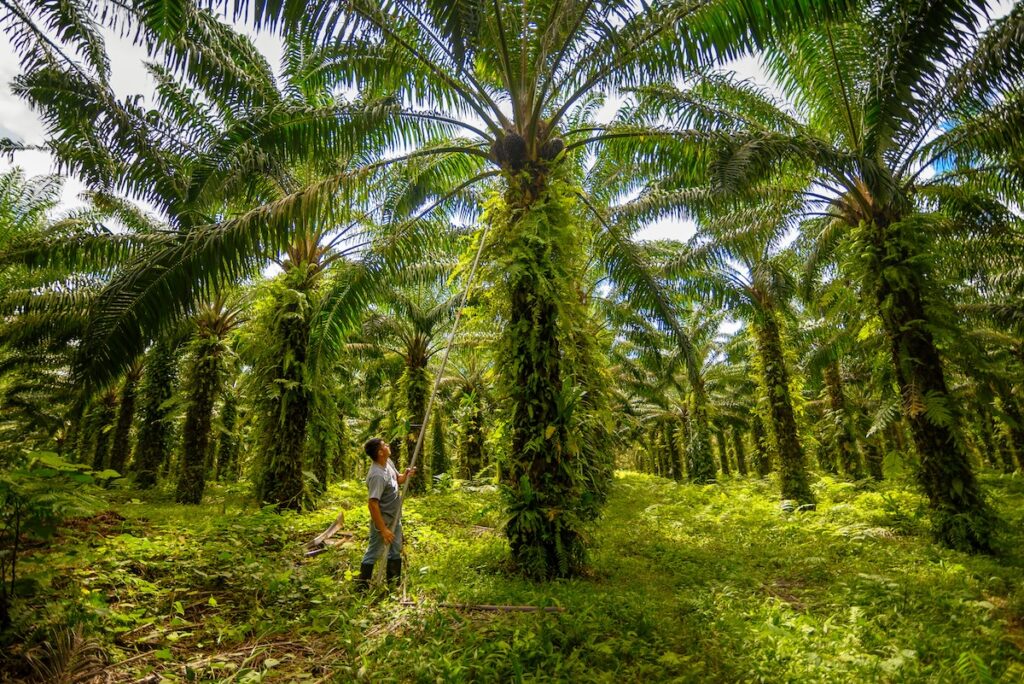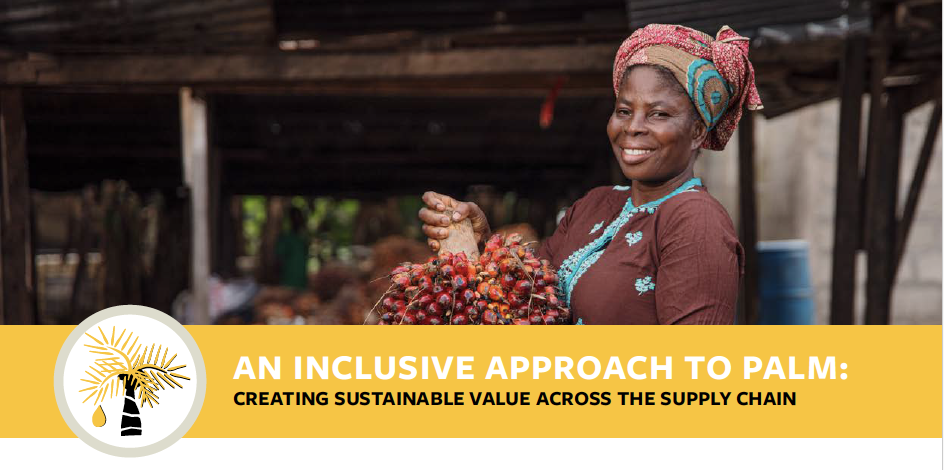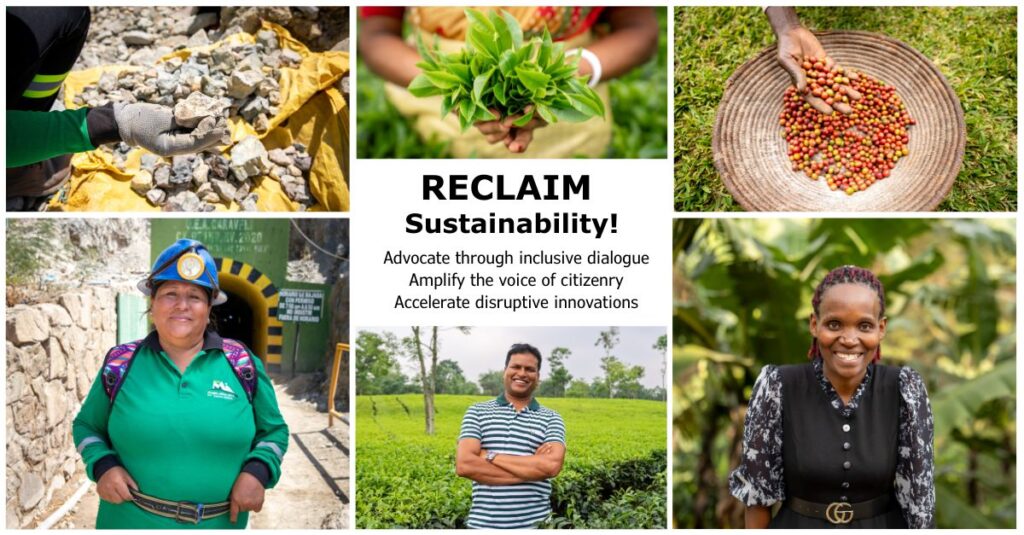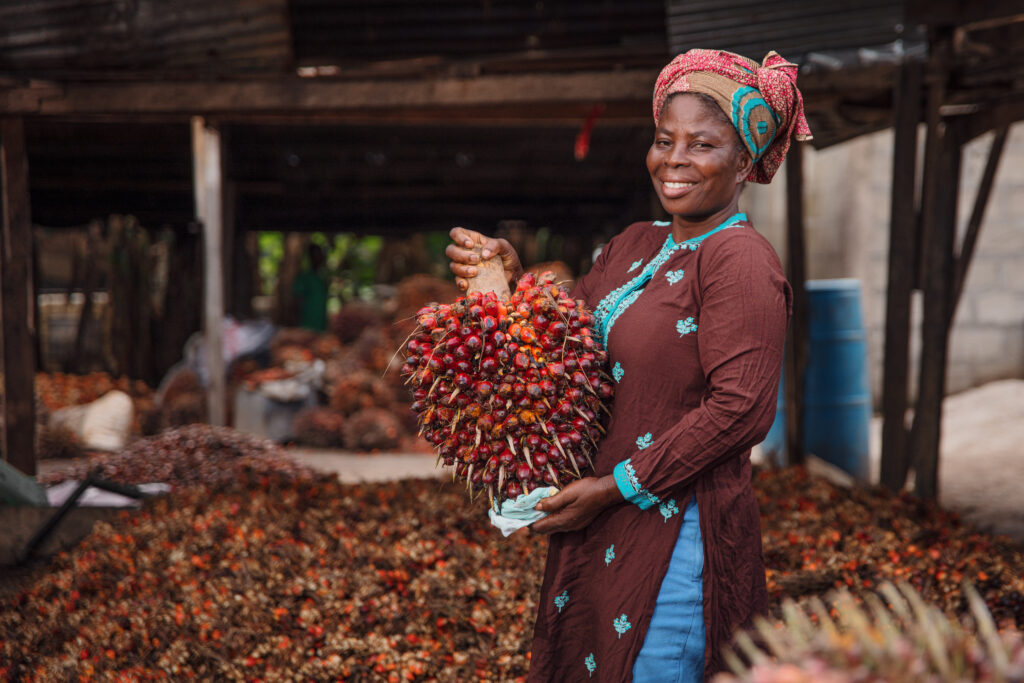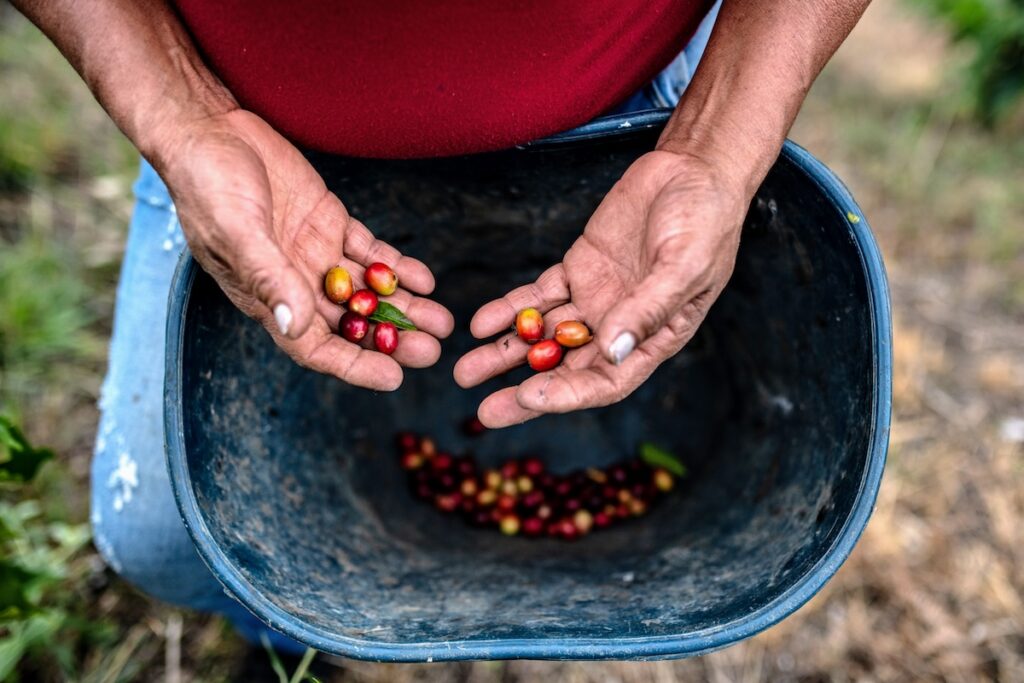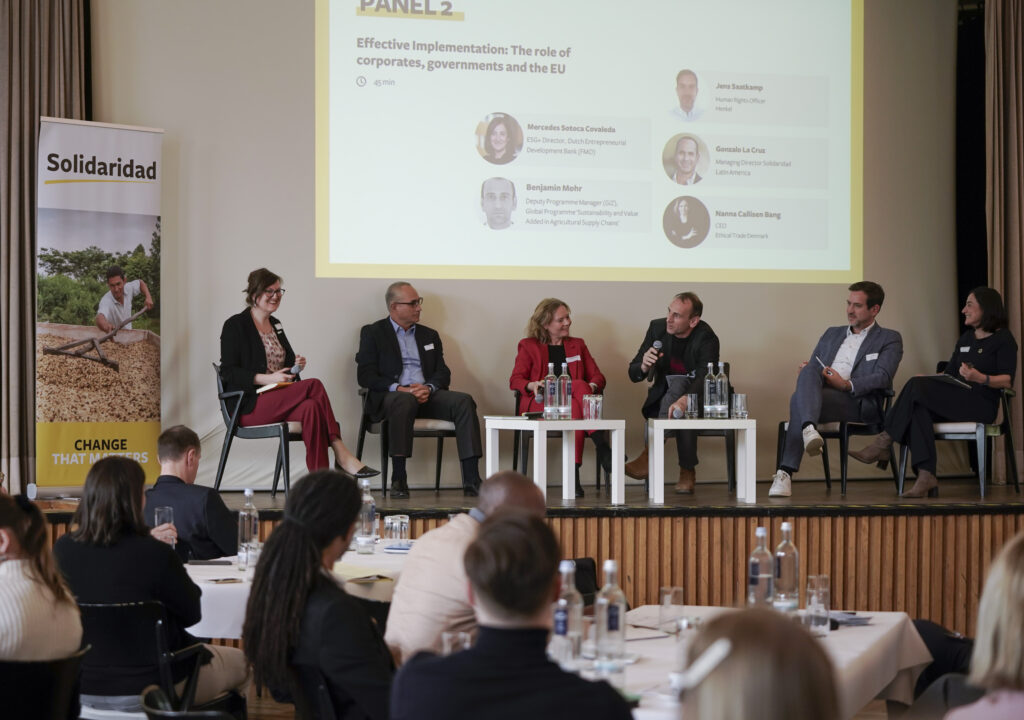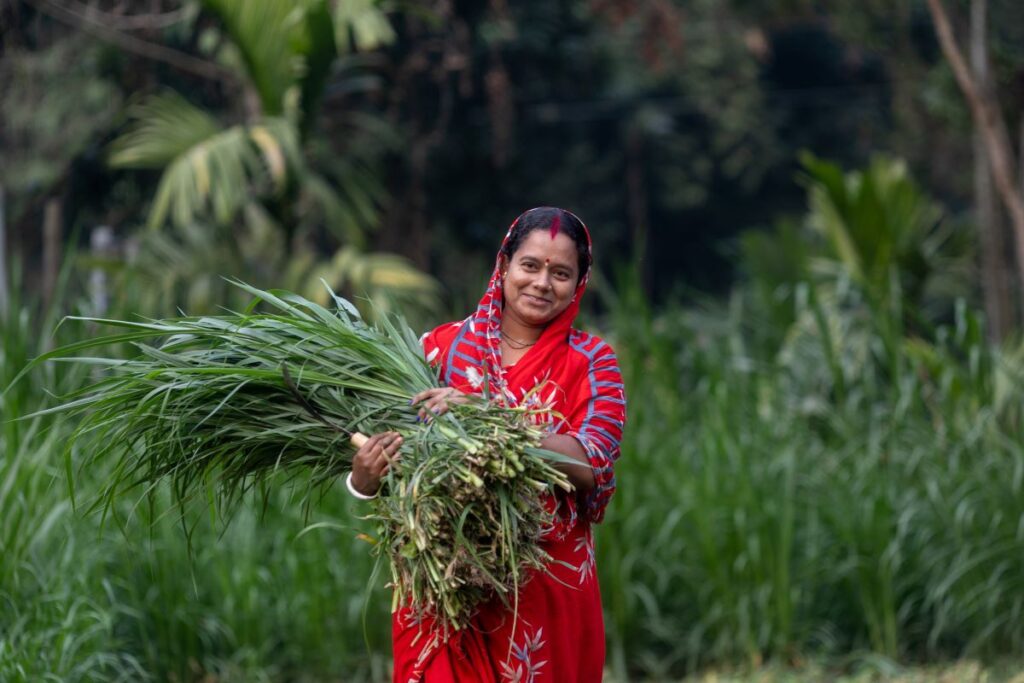La Sierra is a small village, a bumpy two-hour drive from Popayán. Here we meet Diego, his wife Yulieth and their son on their finca Limasol. The finca is somewhat hidden between citrus trees and palm trees. The family has been farming this piece of land for 12 years – three hectares in total. Of these three hectares, one hectare is planted with 4,600 coffee bushes, while the other two hectares are protected woodland.
Diego and Yulieth are part of the ‘Coffee farmers become climate heroes’ project. As part of the project, Solidaridad provided them with shade trees and training on how to use them. Solidaridad technicians subsequently measured their finca and connected it to Rabobank’s carbon trading platform Acorn. When Diego and Yulieth received their first payment for their carbon sequestration in autumn 2023, they were astonished: they had sequestered 26 tonnes of carbon on their 3 hectares of land – and earned 520 US dollars in the process.
The CO2 certificates and the revenue we receive from them are a great help to us. They are an added value that we generate in addition to our coffee production. We can use this money to buy fertilizer or maintain our machines, for example. And we can also fulfil small wishes, such as buying new shoes or going out in the city.”
Diego Edison López, coffee farmer in La Sierra, Cauca
While the carbon market was long out of reach for these farmers, the carbon bound in the trees can now be measured and certified at low cost thanks to satellite technology. This gives the smallholders the opportunity to earn an additional income.
Project participants receive money for carbon sequestration for the first time
The farmers receive at least 20 euros per tonne of CO2 removed – this is the promise made by Rabobank and Solidaridad. But the current market price tops this promise. This year, the sales value for some CO2 certificates was already 31 euros per tonne. Of the sales value, 80% goes directly to the producers, 10% to ACORN and 10% to Solidaridad for project implementation. The Acorn platform was built explicitly for small farmers with a maximum of 10 hectares of land.
In the department of Cauca, 1,200 smallholders have now joined the ‘Coffee farmers become climate heroes’ project. Around 50 of them took part in a cheque handover ceremony in Popayán in September 2023. In addition to handing over the symbolic cheques, the event was primarily about one thing: recognizing the valuable work done by the small farmers in Cauca. This work was celebrated on a large stage with a song composed especially for them. The song’s title “Asombráte” roughly means “let yourself be surprised” and is a play on words with the word “sombra”, which means shade.
It also became clear on stage that ‘Coffee farmers become climate heroes’ is a powerful answer to the question of how the resilience of smallholder farmers can be strengthened and how they can contribute to more sustainable agriculture at the same time. Rural communities have a huge role to play in the transition to a carbon-neutral economy. With projects like this one, Solidaridad helps to strengthen the resilience of communities and build low-emission food chains. Smallholder family farms are crucial in this – and they have great potential as carbon sinks.
The carbon market has always been out of reach for many producers, especially small producers. We were able to develop a solution based on satellite systems and algorithms to ensure that they can sell their carbon credits to a customer like Microsoft.
Joel Brounen, Managing Director Solidaridad Colombia
Once a year, Rabobank uses its Acorn platform to determine how much carbon individual fincas have sequestered in the past year. And the smallholders receive their payment for their carbon sequestration performance accordingly. The first payment is usually made after three years, when the trees are large enough to be detected by satellites. Existing trees can be credited retroactively for up to 5 years if it can be proven that the trees were planted with the aim of generating CO2 certificates and the smallholders received external support.
The methodology behind the sale of the certificates has been certified by Plan Vivo, a certification system specialized in land use and forestry projects for smallholder farmers. As part of the project, the ex-post certificates of the coffee farmers in La Sierra are sold to buyers such as Microsoft and then decommissioned.
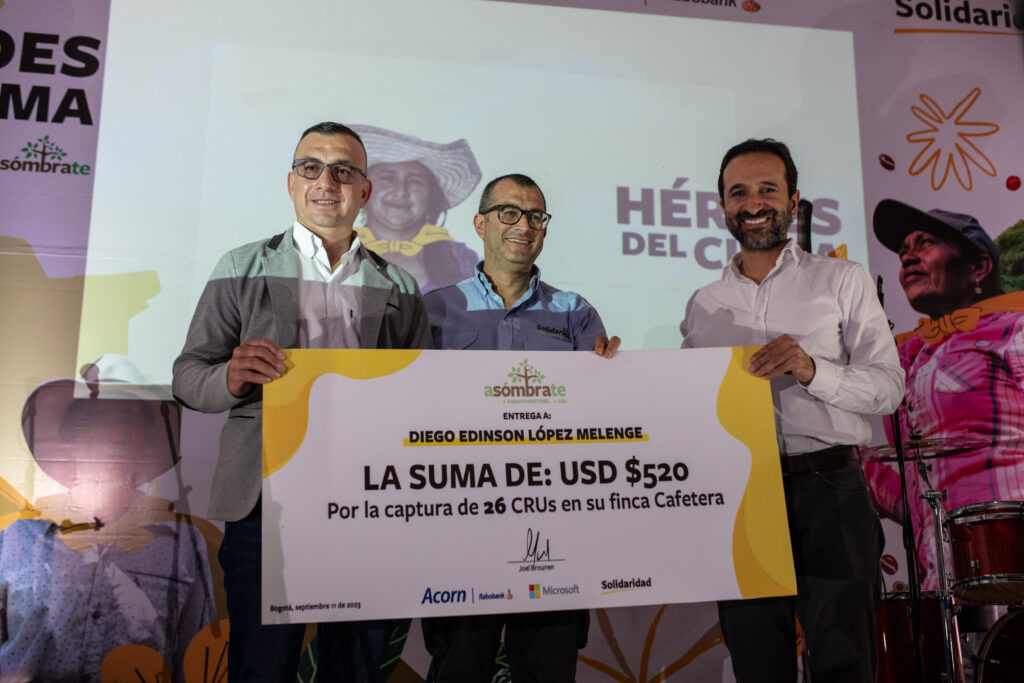
Increased crop yields and additional income thanks to agroforestry
Before Diego took over the ‘Finca Limasol’ following his time in the Colombian military, it was fallow farmland. Over 4,000 coffee bushes now grow here. Diego combines these with shady trees such as acacia, orange and avocado trees. The fact that Diego has been doing this for many years is astonishing, as trees between cocoa or coffee plantations were long considered to reduce yields. The realization is only slowly taking hold: shade trees help to improve soil quality and thus increase crop yields. The trees have deep roots that hold the soil in place, provide nutrients for other plants and attract beneficial insects. The trees also lower the average temperature on the fincas and protect against heavy rainfall and the burning sun – and they contribute to food security, as mangoes, cashews and avocados can be harvested and sold, or consumed by the farmers themselves.
The shade trees help us a lot. For example, they help us to ensure that the soil always has a certain amount of moisture and that there are no landslides.
Diego Edison López, coffee farmer in La Sierra, Cauca
Agroforestry is particularly suitable for crops such as coffee and cocoa, which thrive in the shade of other trees. Studies have shown the multiple benefits of agroforestry systems – proving them to be much more effective measures against climate change than reforestation measures.
Worthless CO2 certificates harm the climate and other projects
Unfortunately, research by ZEIT and the Guardian shows that many reforestation projects often do not actually reduce emissions. These projects refer to avoided deforestation and thus to hypothetical future emissions to be reduced. This hypothetical future scenario allows for a range of assumptions and possibilities, artificially inflating both emissions and reductions.
In the case of carbon sequestration through agroforestry, trees are actually planted and their biomass growth is monitored and measured annually using satellite data. The growth of the trees leads to an annual accumulation of CO2 in the trees. This CO2 is then monetized if the balance is positive; if the balance is negative, no CO2 certificate is generated and no payment is made.
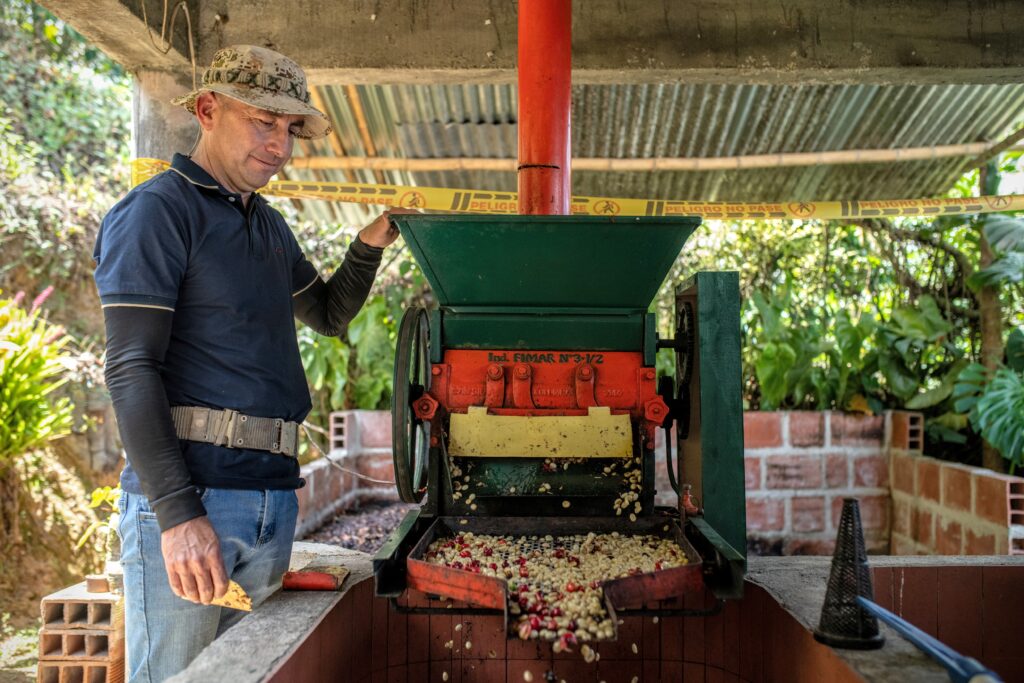
The fact that Diego was able to sequester 26 tonnes of carbon is unusual. In similar projects, the average was four to six tonnes of carbon per hectare. However, Solidaridad’s work in the department of Cauca has already shown that the average value here is significantly higher than in other areas of Colombia. A new measurement next year will show whether this trend will continue.
As coffee farmers, we have always had a sense of conservation, but we have never been rewarded for it. It is a great pleasure for us to receive this incentive.
Diego Edison López, coffee farmer in La Sierra, Cauca

Thanks to the German Postcode Lottery!
We would like to thank the German Postcode Lottery for supporting the ‘Coffee farmers become climate heroes’ project. This is made possible by the participants of the German Postcode Lottery, who support this project with their lottery ticket purchases. Thank you for that!

